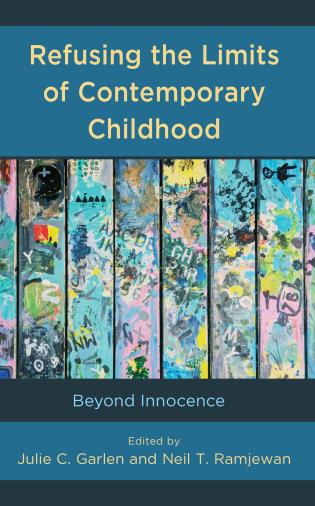An interview with Julie Garlen and Neil Ramjewan about their edited collection, Refusing the Limits of Contemporary Childhood: Beyond Innocence
Our member, Prof. Julie Garlen (Carleton University, Canada), and her co-editor, Neil Ramjewan (University of Toronto, Canada), talk about their edited collection,
Refusing the Limits of Contemporary Childhood: Beyond Innocence (Rowan & Littlefield, 2023).

Q: What is this edited collection about?
This collection of essays is an intervention that seeks to address the lack of both Majority world and non-white Minority World perspectives on childhood and make space for critical work that attempts to move beyond the limiting discourses of innocence. The contributors include both established and emerging scholars who engage with childhood from a wide range of disciplinary perspectives and drawing from different theoretical and methodological perspectives. Instead of focusing on how children “grow up,” as has been the focus of developmental science for over a century, we ask what it might mean for discourses of childhood to finally “grow out” of childhood innocence?
Q: What made you initiate this volume?
We initiated this volume in order to broaden the conversation around childhood innocence and experience. Although the field of childhood studies has certainly expanded the limits of thinking about children and childhood, and has seen a number of recent interventions that refuse such invisibility and resist disciplinary boundaries, there remains a need for spaces that de-centre white, Eurocentric perspectives where emerging scholars from can dismantle, decolonize, Brown, and Indigenize the domain of childhood. We saw this collection as one such space.
An excerpt from the introductory chapter:
Part of the significance of this collection is a response to the charges of white supremacy we have raised, evidenced by the absence of racialized scholars even as there has been a recent shift towards a greater diversity of discourses and perspectives (Cook, 2020). It is our belief that the inclusion of predominantly Black, Brown and Indigenous scholars in this collection, while not immune from internalized forms of prejudice and discrimination, also comes with lived and autobiographical relationships to the discourses we seek to interrogate and the ways we seek to so. In particular, the prevailing globally organizing structures of racism and colonization have salience in the work that this collection of authors bring to childhood studies, which continues to have little traction in terms of central concerns for scholars (Canosa and Graham, 2020).
These discourses shape what is meant by the social construction of childhood, a persistent theme in childhood studies. In fact, the social constructedness of childhood has become a prevailing assumption by scholars in the field which according to Hammersley (2017) rejects the "internalization of norms" which developmental psychology offers, and is instead deemed to be a form of determinism that is at odds with another preoccupation of the field, children's agency. Hammersley (2017) suggests that a more radical version of social constructionism driven by discursive theoretical and methodological approaches would invite "very different kinds of work from what currently makes up the field" (p. 118). This is precisely what we aim to do in this collection.